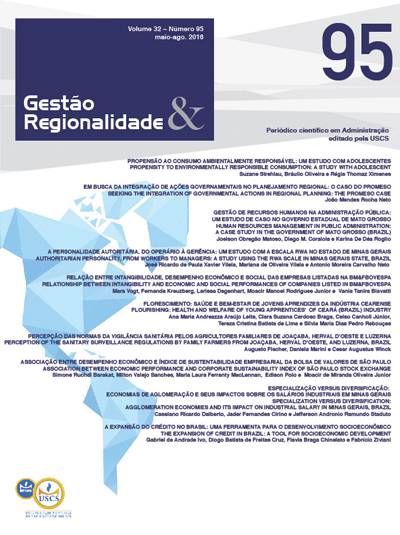Propensity to environmentally responsible consumption: a study with adolescents
DOI:
https://doi.org/10.13037/gr.vol32n95.2051Abstract
Young people born in the late 1990s have received much information about sustainability, which is considered fundamentalin the formulation of a new mentality of consumer education. But how these young people behave in relation to theenvironment? The aim of this study was to examine the propensity of young secondary students towards environmentallyresponsible consumption. For this, a scale tested and considered adequate to measure it was used, in addition to profile variablesidentified as influential in the literature. A survey was carried on with 138 students in a public high school in the cityof Jaguariúna (SP). Results show that the only variable of the profile with discriminatory power to measure the propensity tothe responsible consumption is gender. Furthermore, it was found that of the 40 items used in the scale, four are determinantsto measure the propensity towards environmentally responsible consumption, which two are concerned to personalbehavior and two are regarding to financial efforts. One of the most important contributions of this study is the propositionof a model that can be used in the future to follow the effect of environment education of youth and of the changes onattitudes of these future customers.Downloads
Downloads
Published
2016-06-03
How to Cite
Strehlau, S., Oliveira, B., & Ximenes, R. T. (2016). Propensity to environmentally responsible consumption: a study with adolescents. Gestão & Regionalidade, 32(95). https://doi.org/10.13037/gr.vol32n95.2051
Issue
Section
Articles
License
Copyright (c) 2016 Suzane Strehlau, Braulio Oliveira, Régis Thomaz Ximenes (Autor)

This work is licensed under a Creative Commons Attribution-NonCommercial-NoDerivatives 4.0 International License.
Autores que publicam nesta revista concordam com os seguintes termos:
- Autores mantém os direitos autorais e concedem à revista o direito de primeira publicação, com o trabalho simultaneamente licenciado sob a https://creativecommons.org/
licenses/by-nc-nd/4.0/ , permitindo o compartilhamento do trabalho com reconhecimento da autoria do trabalho e publicação inicial nesta revista. - Autores têm autorização para assumir contratos adicionais separadamente, para distribuição não-exclusiva da versão do trabalho publicada nesta revista (ex.: publicar em repositório institucional ou como capítulo de livro), com reconhecimento de autoria e publicação inicial nesta revista.
- Autores têm permissão e são estimulados a publicar e distribuir seu trabalho online (ex.: em repositórios institucionais ou na sua página pessoal) a qualquer ponto antes ou durante o processo editorial, já que isso pode gerar alterações produtivas, bem como aumentar o impacto e a citação do trabalho publicado (Veja O Efeito do Acesso Livre).
























